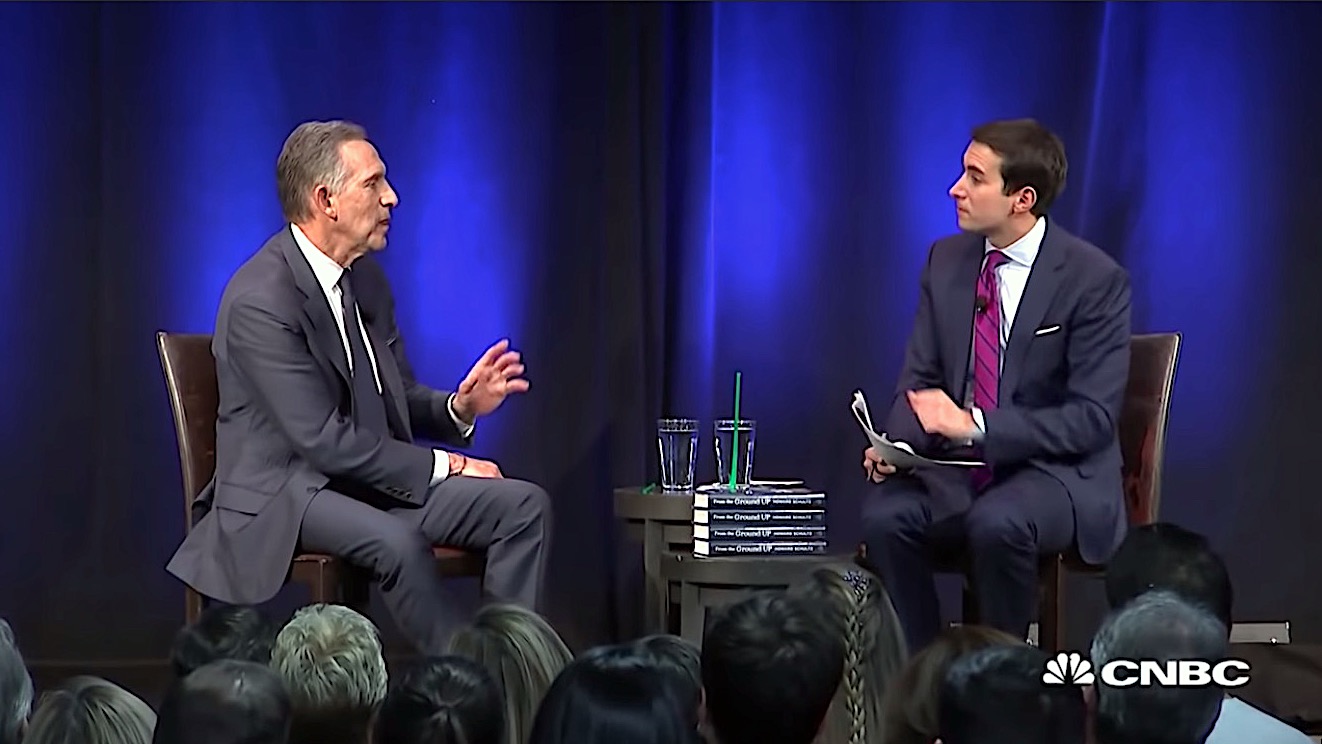Howard Schultz doesn't like the word 'billionaire,' prefers the more genteel 'people of means'


A free daily email with the biggest news stories of the day – and the best features from TheWeek.com
You are now subscribed
Your newsletter sign-up was successful
At a Manhattan Barnes & Nobel in Manhattan last week, financial journalist Andrew Ross Sorkin asked budding "centrist independent" presidential candidate Howard Schultz if he agreed with Winners Take All author Anand Giridharadas — plus Rep. Alexandria Ocasio-Cortez (D-N.Y.) and other wealth-tax Democrats — that "billionaires have too much power in American public life." At least one viewer enjoyed his answer.
"You haven’t lived until you've seen Howard Schultz's facial muscles react when @andrewrsorkin asks, on my behalf, if billionaires have too much power in American life," Giridharadas tweeted above a video of Schultz's answer. The interview is most famous for a heckler who called Schultz an "egotistical, billionaire a--hole," and the former Starbucks CEO began by suggesting the label "billionaire" might be a little toxic nowadays. He offered some alternatives.

"The moniker 'billionaire' now has become the catchphrase," Schultz said. "I would rephrase that and I would say 'people of means' have been able to leverage their wealth and their interest in ways that are unfair. And I think that speaks to the inequality, but it also directly speaks to the special interests that are paid for by people of wealth and corporations who are looking for influence, and they have such unbelievable influence on the politicians who are steeped in the ideology of both parties." He's not, he said. "All I'm trying to do is one thing: Walk in the shoes of the American people."
The Week
Escape your echo chamber. Get the facts behind the news, plus analysis from multiple perspectives.

Sign up for The Week's Free Newsletters
From our morning news briefing to a weekly Good News Newsletter, get the best of The Week delivered directly to your inbox.
From our morning news briefing to a weekly Good News Newsletter, get the best of The Week delivered directly to your inbox.
Schultz did not at that moment explain what "ideology" has to do with money in politics, which "special interests" he finds problematic, or how "people of means" and "people of wealth" think they can "walk in the shoes of the American people" while they still have, unlike most of the American people, many billions of dollars. But he does address his humble upbringing in the hourlong Q&A, and you can watch the entire thing if you are interested.
A free daily email with the biggest news stories of the day – and the best features from TheWeek.com
Peter has worked as a news and culture writer and editor at The Week since the site's launch in 2008. He covers politics, world affairs, religion and cultural currents. His journalism career began as a copy editor at a financial newswire and has included editorial positions at The New York Times Magazine, Facts on File, and Oregon State University.
-
 Labor secretary’s husband barred amid assault probe
Labor secretary’s husband barred amid assault probeSpeed Read Shawn DeRemer, the husband of Labor Secretary Lori Chavez-DeRemer, has been accused of sexual assault
-
 Trump touts pledges at 1st Board of Peace meeting
Trump touts pledges at 1st Board of Peace meetingSpeed Read At the inaugural meeting, the president announced nine countries have agreed to pledge a combined $7 billion for a Gaza relief package
-
 Britain’s ex-Prince Andrew arrested over Epstein ties
Britain’s ex-Prince Andrew arrested over Epstein tiesSpeed Read The younger brother of King Charles III has not yet been charged
-
 TikTok secures deal to remain in US
TikTok secures deal to remain in USSpeed Read ByteDance will form a US version of the popular video-sharing platform
-
 Unemployment rate ticks up amid fall job losses
Unemployment rate ticks up amid fall job lossesSpeed Read Data released by the Commerce Department indicates ‘one of the weakest American labor markets in years’
-
 US mints final penny after 232-year run
US mints final penny after 232-year runSpeed Read Production of the one-cent coin has ended
-
 Warner Bros. explores sale amid Paramount bids
Warner Bros. explores sale amid Paramount bidsSpeed Read The media giant, home to HBO and DC Studios, has received interest from multiple buying parties
-
 Gold tops $4K per ounce, signaling financial unease
Gold tops $4K per ounce, signaling financial uneaseSpeed Read Investors are worried about President Donald Trump’s trade war
-
 Electronic Arts to go private in record $55B deal
Electronic Arts to go private in record $55B dealspeed read The video game giant is behind ‘The Sims’ and ‘Madden NFL’
-
 New York court tosses Trump's $500M fraud fine
New York court tosses Trump's $500M fraud fineSpeed Read A divided appeals court threw out a hefty penalty against President Trump for fraudulently inflating his wealth
-
 Trump said to seek government stake in Intel
Trump said to seek government stake in IntelSpeed Read The president and Intel CEO Lip-Bu Tan reportedly discussed the proposal at a recent meeting
